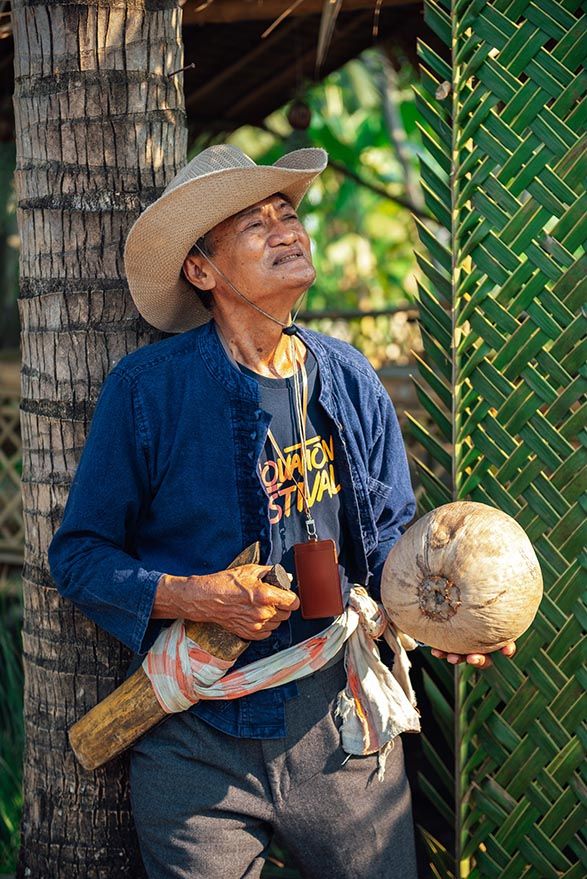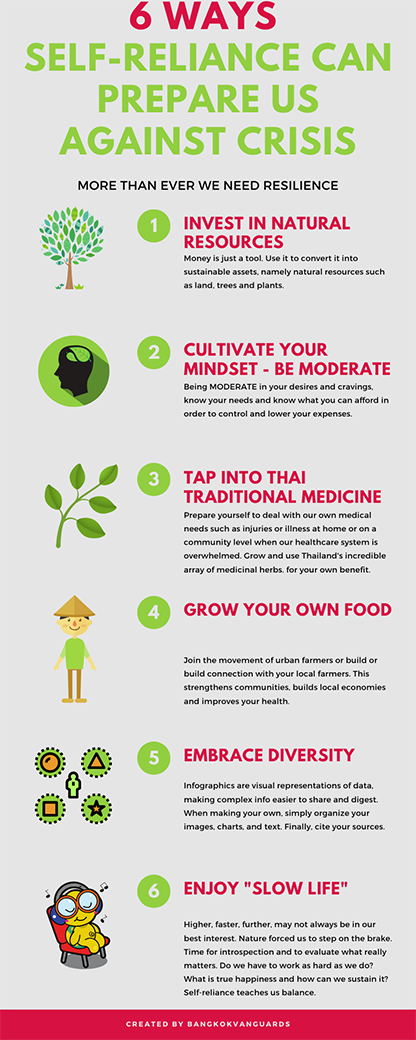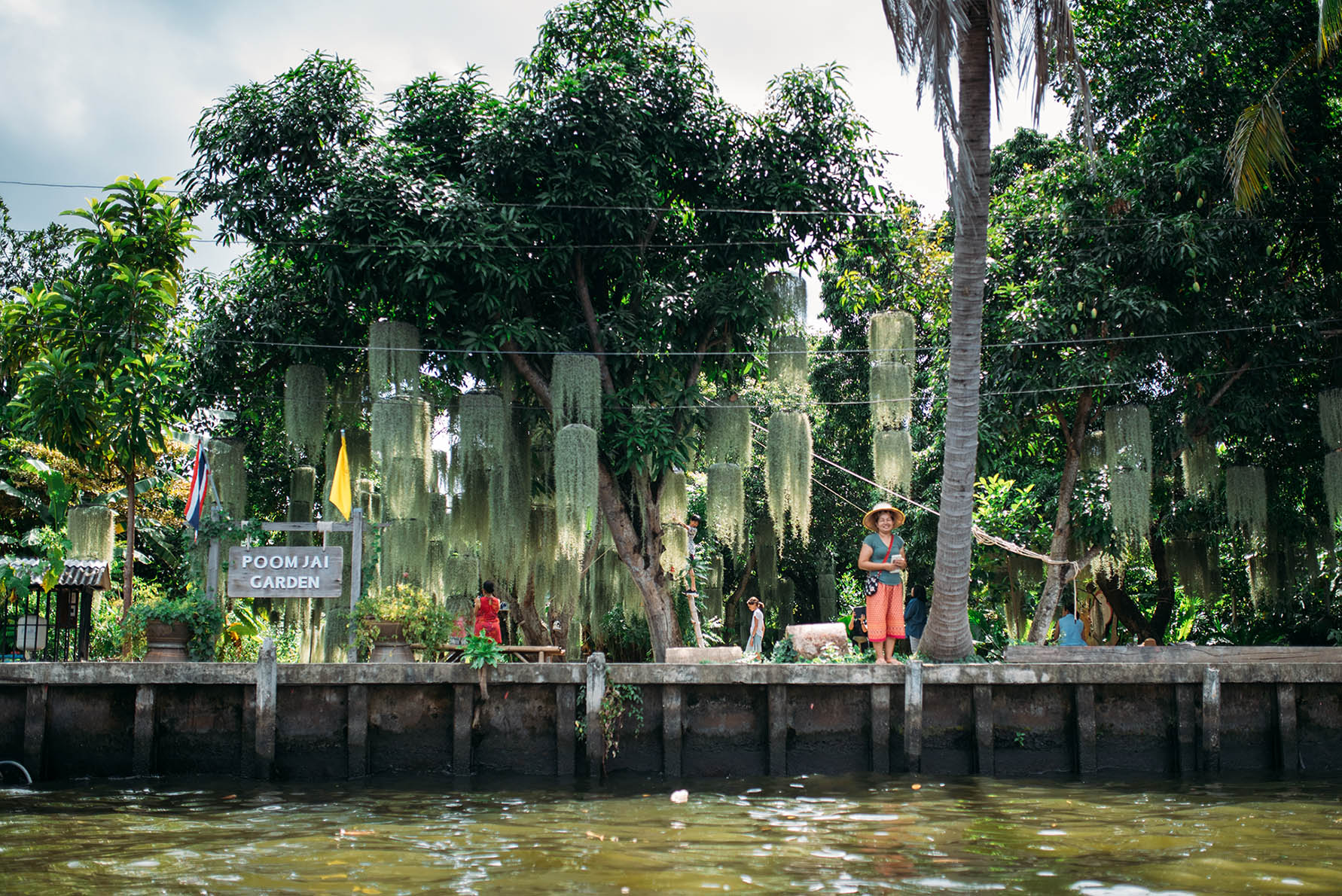How does this pandemic make you feel?
We have been exposed to daily death statistics, especially since the third wave began in April 2021. Images of dead bodies in the streets, suicide rates and business closures rising, unleashing societal anger on social media, name calling the government while youth protesting and clash with state authorities. With problems abound, we don’t want to succumb to the feeling of resignation and hopelessness but look for answers of a way out of this situation. Is there a way out?
A way out largely depends on the government through the procurement of vaccine and the provision of testing and other essential healthcare infrastructure. But can we do as individuals? I want to focus less on the way out and provide some valuable and practical resources for a way through.
Covid-19 is felt in different ways, depending on your circumstances. The impact for the home office elite is different from that of informal workers in Bangkok. While some people worry about building a following on Tic Toc, others may worry about how to get the family through with 600 Baht (20 dollar) left in the bank. Regardless where you stand, what we all share is uncertainty. The subconscious, omni-present feeling of not knowing when this will end or how we will rebound from a shock of such scale.
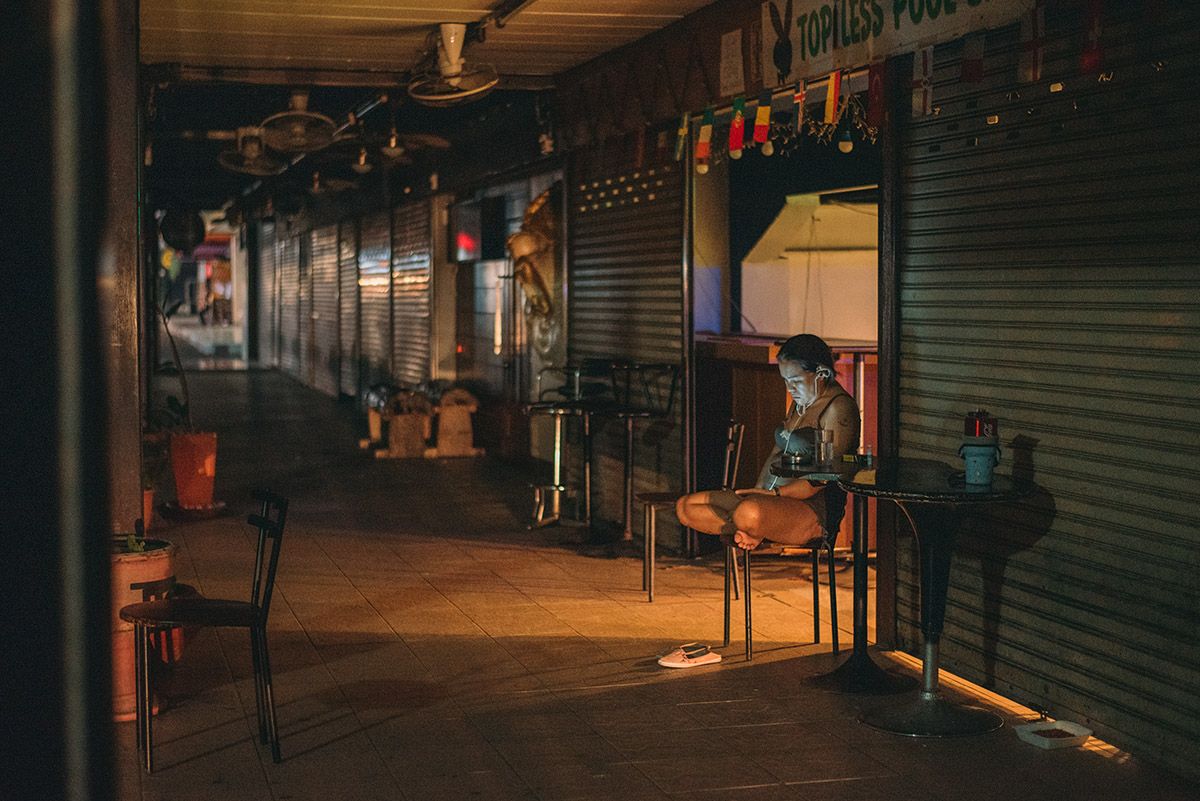
Bangkok’s once bustling nightlife areas have become ghost towns.
What can we control? Lets focus on the solutions
In a world that you can’t control, you can still choose to control your response. You can act virtuously, adapt and do your best to protect yourself and your loved-ones. The more you choose to focus on the things you can control and help each other, the higher the chance for success. Lets not waste energy on things that are outside our control. But what was one thing that the pandemic revealed about us?
Covid-19 revealed a very low level of self reliance in society and this weakness needs to be addressed… but first things first. What is self-reliance?
Self-reliance means to meet all your basic needs (food, medicine, housing and clothes) through what is available in our environment. Although it’s rather unlikely that you will move to the countryside to become self-reliant farmers, you can still learn and apply the principles of self-reliance to prepare more effectively against global shocks like Covid-19. But what makes it so powerful?
Self-reliance builds community, provides better security and improves your health and that of your environment. It improves your financial situation and reduces your dependency on external factors. Let me explain but first… Don’t fall for the misconceptions!
Self-reliance is not anti globalization nor will you go back to the stone-age. It is not entirely anti consumerist or an esoteric sect disconnected from the realities of modern life. It is an approach to life that balances economic, social, environmental and cultural needs. What does it mean exactly? Lets start by looking at the relationship between self-reliance and money?
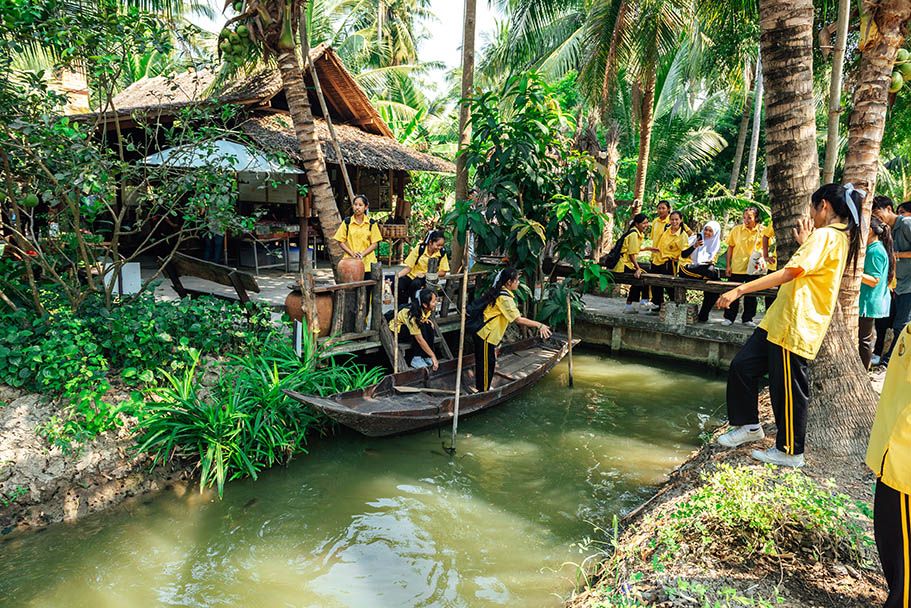
School children learning about the sufficiency economy philosophy.
1
Is insurance really the
best security?
In self-reliance, money is a tool convert it into sustainable assets namely natural resources such as land, trees and plants. By now we are all aware that Covid-19 has become a massive economic crisis in itself. Thailand has already experienced a massive financial crisis in 1997 in which millions were thrown out of their jobs without a safety net. If you had a family in the countryside, you were better off staying with them and that’s what many people have intuitively been doing during Bangkok’s lock-downs. Many people still own land which proves to be an invaluable asset. You may have lost your job but in the countryside you have a place to sleep, you have food and you have your family around. You will survive and you can rebuild.
Me and farming seems as related as Pocahontas and Wall Street. What if I’m not a farmer?
Regardless of becoming a farmer or not, investing in land has become a sensible choice to prepare for retirement and a secure future but here’s the question you need to ask yourself, if you want to build self-reliance. Am I willing to cultivate a piece of land? If yes, where will I get the skills and knowledge to do so?
Fortunately, Thailand has plenty of places to learn about permaculture, organic farming and self-reliance. We at bangkokvanguards also offers workshops on these topics with our partners but if you are in hurry check out the links below:
Doing it alone or with a team? If you can live with strangers in a gated community then why not living with friends on a piece of land, cultivating it on a common vision, equipped with different expertise? On your own land and with a team you are much happier and more secure regardless of any future shocks. If you can’t or don’t want to buy a piece of land? Then there are still other ways to buffer against difficult times.
2
Mindset, be moderate.
Being MODERATE in your desires and cravings, know your needs and know what you can afford. It sounds like a no brainer but guess what… Even in a Buddhist society this message still has to reach millions.
Thailand’s household debt is at a staggering 178,994 baht on average per household as of 2017. (Source: National Statistical Office Thailand)
From 2007 to 2015 total household debt increased from 54.6% to 84.2% of Thailand’s GDP leading to massive financial vulnerabilities even without a pandemic.
“According to Pooyai Viboon of the Earthnet Foundation, just 25% self-reliance is enough to both move families and communities out of the debt cycle and to build real resilience. 25% on a family level means that 25% of what you would spend on everything you need in terms of goods and services, you can provide for yourselves.” – Michael Commons
Self-reliance doesn’t require you to live like a monk. You still need quality tools to do your work and if your wife or girlfriend works hard and she would like to have this beautiful dress and it makes her day. Why not? A certain level of luxury is permissible within your means and if you can’t invest in land, then create the savings that protect you in times of needs.
This worked for me: When I founded bangkokvanguards, I actualised my purpose, becoming an entrepreneur and working something larger than myself made things that I usually enjoyed such as going out, spending money on stuff less important. Developing a deeper meaning, made me rich in pride, knowledge and happiness. Money is still important but it’s secondary to other values. It might sound cheesy but that’s what my mother who is a Thai Buddhist taught me, the simple attitude of moderation. It helps me to get through after over one and half years with largely no income, I moderate myself, plan my financials, focus on the essentials and live a more minimalist life-style. Thank you Mom.
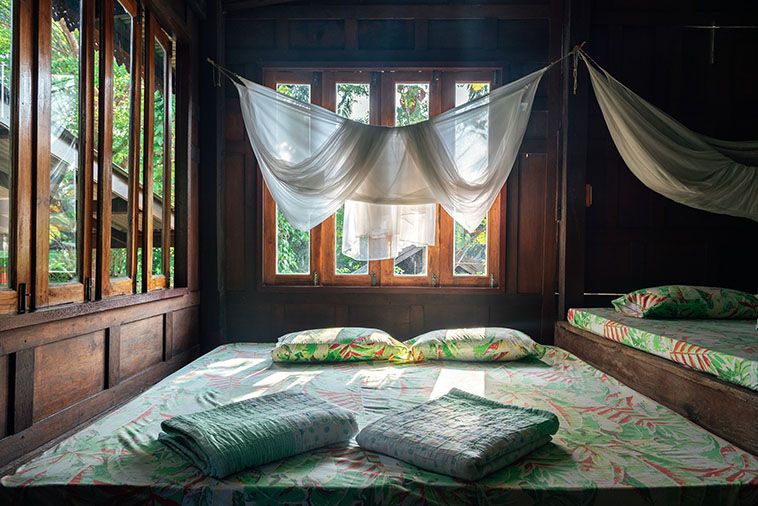
A place to stay. How much do we need?
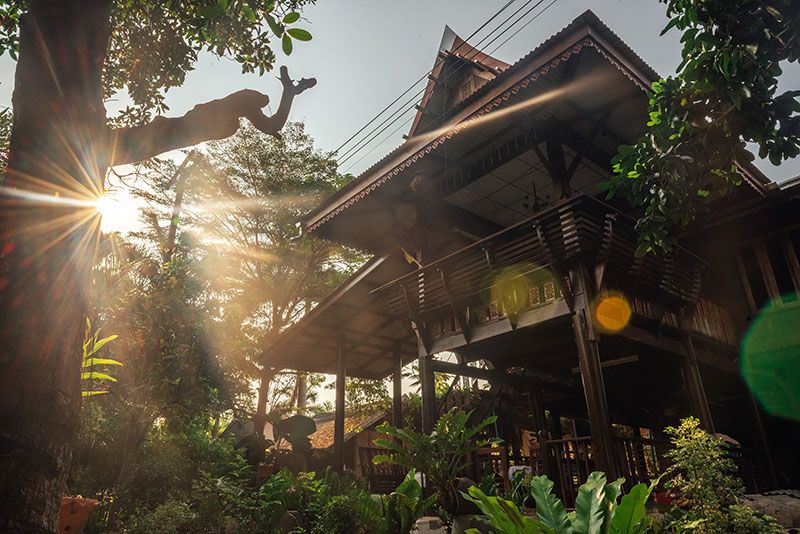
A home in the countryside.
3
Tap into Thai traditional medicine
What are you going to do when you have an illness but the hospital is crowded and prioritized for Corona Virus patients? While our healthcare systems are overwhelmed, how well are you prepared to deal with our own medical needs such as injuries or illness at home or on a community level? If you find it difficult to receive treatment or you don’t even want to visit any of the hospitals for fear of contracting the virus.
Lets address our basic medical needs. Around fifty years ago traditionally all of Thai households would have a basic knowledge of herbs and communities would have local traditional doctors and midwives that were able to handle things. Though Thai herbal medicine went out of favor a few decades ago, the last 25 years has seen a resurgence of interest and a foundation of traditional Thai medicine. We see excellent modern medical research on the efficacy and safety of Thai herbs, some of which are on the national registry of medicine. Today, you can also find traditional medicine departments in hospitals with very modern pharmaceutical grade production for herbal supplements and there is a full new wave of new young and inspiring Thai traditional doctors and pharmacists certified and accredited with this and this is exciting.
How can you build medicinal resilience? Should you grow my own herbs, or should you buy supplements? Some herbs have been household names for thousands of years like Turmeric, a type of super food that helps with stomach related issues. Almost all of old traditional Thai medicine incorporate a number of herbs in one of treatment. Michael Commons wrote an excellent article on Thai herbs, explaining the herb that shows the strongest anti-viral properties which has been tested and proven efficacy with SARS, bird flu and with other influenza or diseases that are at least similar to the current Covid-19.
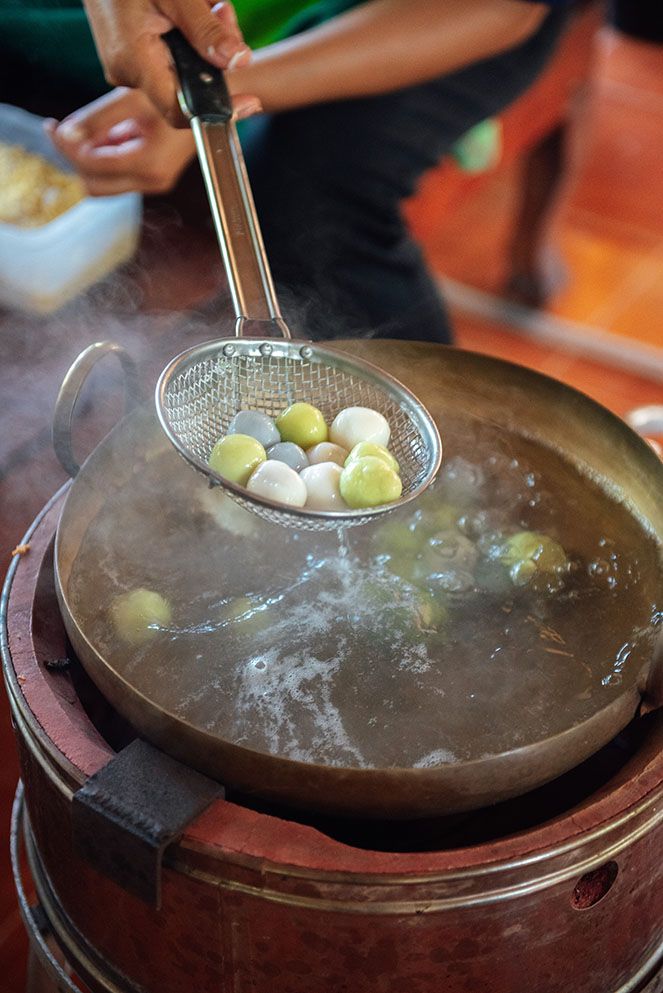
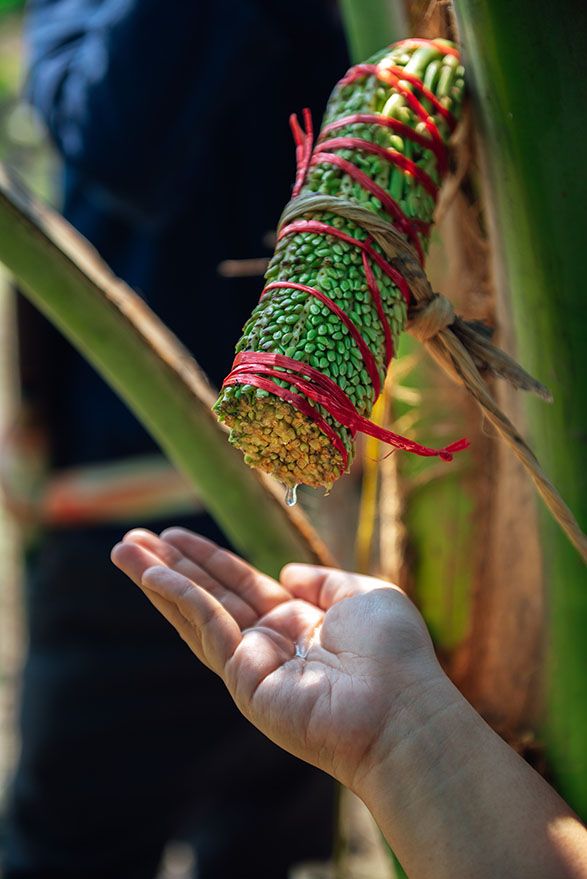
Utilizing what nature provides.
Lets plant Thai traditional herbs. If you are interested in purchasing seeds to grow your own herbs, you can contact the hospital directly or get in touch with us or Michael Commons.
Which herbs to choose? Thai herbal medicine encompasses thousands of herbs but what is being promoted in research is about forty and below you will find a list of the top ten of useful herbs you can grow and harvest locally.
The top 11 most useful Thai medicinal herbs. Ok, wait… before jumping right into the world of medicinal herbs, you should have a quick idea of what other super foods can build your health and immune system and which are essential for cooking as well…
- Garlic
- Ginger
- Galangal
- Lemongrass
- Holy basil (Thai: Krapao) and other basils and mints
- Pandan leaf (Thai: Toey hom)
- Honey, needs to be raw and uncooked. Wild honeys from native bees or stingless bees have much more medicinal property than from farmed European bees.
- Kaffir lime leaves
- Limes (but should be free of chemical use to be medicinal)
- Tamarind
- Black pepper (but should be free of chemical use to be medicinal)
If you grow a selection of Thai herbs and spices as many Thai rural families do, you can build your own little pharmacopia but I’m not stopping here…
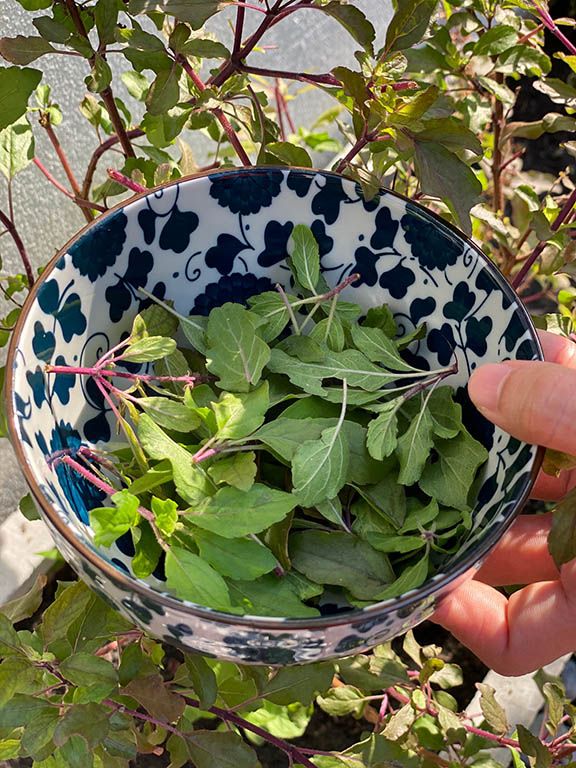
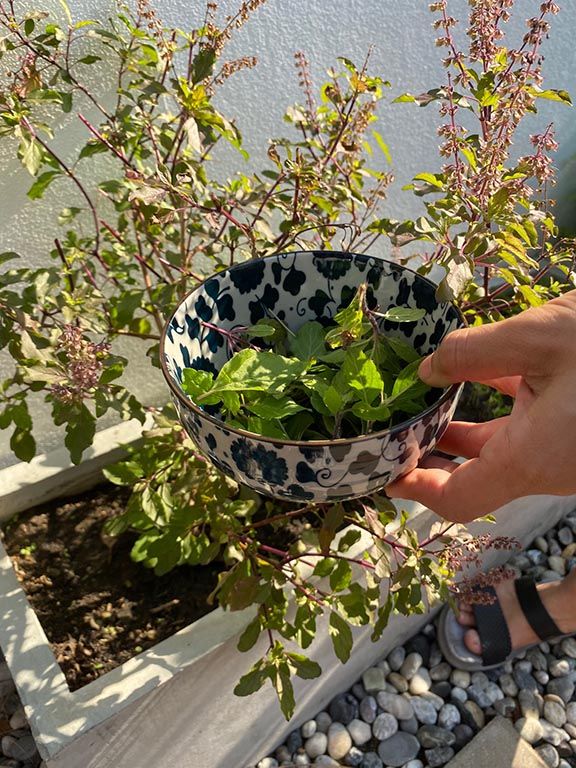
Homegrown herbs in our own yard. Some combine both medicinal properties as well as top ingredients for food. Food that you can trust.
Eight Thai herbs you can grow in your garden.
- Kaminchan – Turmeric- Curcuma longa: favorite herb for many stomach and intestinal conditions (also used in Southern Thai cooking).
- Plai – Cassumunar ginger: favorite herb for muscle relaxation/ tension/ massage.
- Bua Bok – Centella Asiatica: makes a nice drink, very cooling, good for brain function.
- Yang Nang – Tiliacora triandra: very cooling herb – also used commonly in cooking bamboo dishes as it combines well and can help prevent longterm negative effects of eating bamboo.
- Fa Talai Jon – Andrographis paniculata: (already presented in earlier article).
- Rang Cherd – Thunbergia laurifolia: This is used to detoxify and including with food poisoning.
- Salet Pungporn – Clinacanthus nutans: This is a favorite herb for treating effect of bites and stings including to treat snakebite. Thai name means the saliva of the mongoose.
- Ya Nuad Maeo – Orthosiphon aristatus: This is primary used to treat kidney issues.
- Limes (but should be free of chemical use to be medicinal)
- Tamarind
- Black pepper (but should be free of chemical use to be medicinal)
Lets add another line of defense to our personal and communal health. 2 easy to grow medicinal fruits
- Krajiab – Roselle – Hibiscus sabdariffa Linn: makes a delicious drink that can help reduce fat levels in blood vessels/ heart disease.
- An Chan – Butterfly Pea flower- Clitoria ternatea: makes a nice drink that is said to promote immune system and has antioxidants. Also used for hair growth and health.
4
Grow your own food or connect
with your local farmer.
No resilience with an empty stomach. Unlike 2011 when certain supplies were threatened by a massive flood that inundated much of central Thailand, the overall supply of food during Covid-19 has been stable thanks to fresh markets, food deliveries and supermarkets still operating in full swing. But what if you can’t afford or you don’t want to make the journey to the supermarket? Lets take a look at self-reliance in an urban context.
Urban farmers to the rescue? The percentage by which Bangkokians cover their daily calories through products farmed in the city is miniscule and it’s time to push that percentage. So, lets take a look at those are already doing it and lets give them support:
Build direct connection with local farmers. You can strengthen local communities and improve your health not to mention counter the dominance of large agro-companies. The nearest farms in Bangkok are an hour outside the city center. There are already some established distribution networks, urban farmers and farmers markets (though we need to see how these markets reorganize post-covid). One farming initiative is the Sampran Organic Farm which is connected to a local network of organic farmers. I will research more great farming initiatives and post in future blog posts.
Now that you are applying the modest mindset ever, plan to build and support communities, invest in natural resources, try out growing our own food or herbal repertoire while building the financial shock absorbers we are ready for the last bit on our journey toward self-reliance…
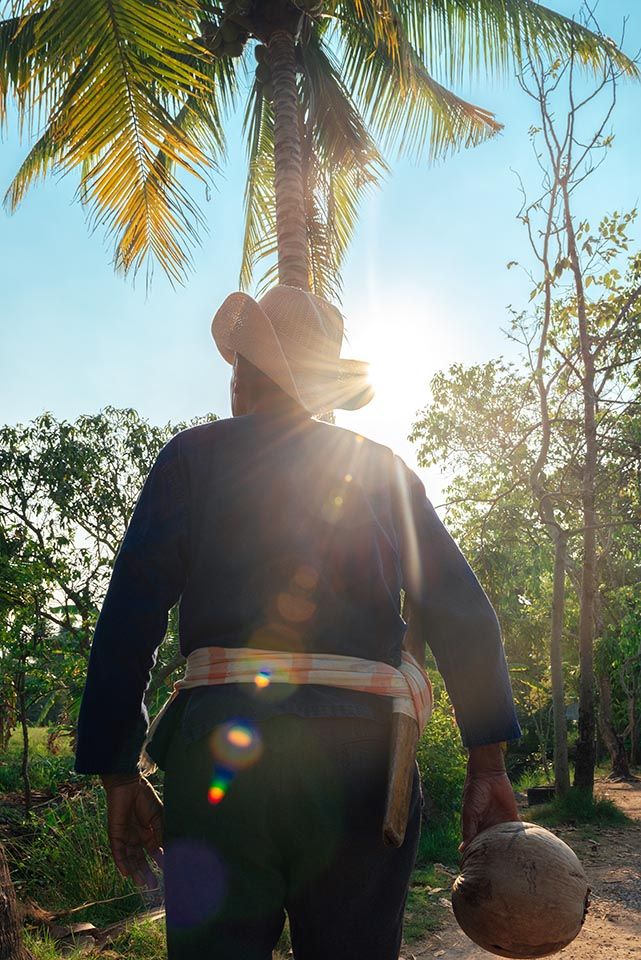
Homegrown herbs in our own yard. Some combine both medicinal properties as well as top ingredients for food. Food that you can trust.
5
Embrace diversity
Diversity is strength. Planting a wide variety of plants, trees, vegetables and fruits is economically and ecologically better than growing a single crop year after year on the same land. Monocropping is high risk as the soil degrades and leads to destructive practices. Dependence on big agro-companies with sometimes unfair practices and increasing extreme weather patterns place these farmers in a precarious situation. When the shit hits the fan there is no backup plan because one relied on a single system, and placed everything on one card. But is your mindset any different from those monocropping farmers? Lets learn from these mistakes because…
You can’t be sure whether super disruptions like Covid-19 are just a prelude to new normal? Not just pandemics or the threat of climate change and social or political upheavals. The technological disruption in the job market alone will require us to become more flexible and adaptive than any generation before us.
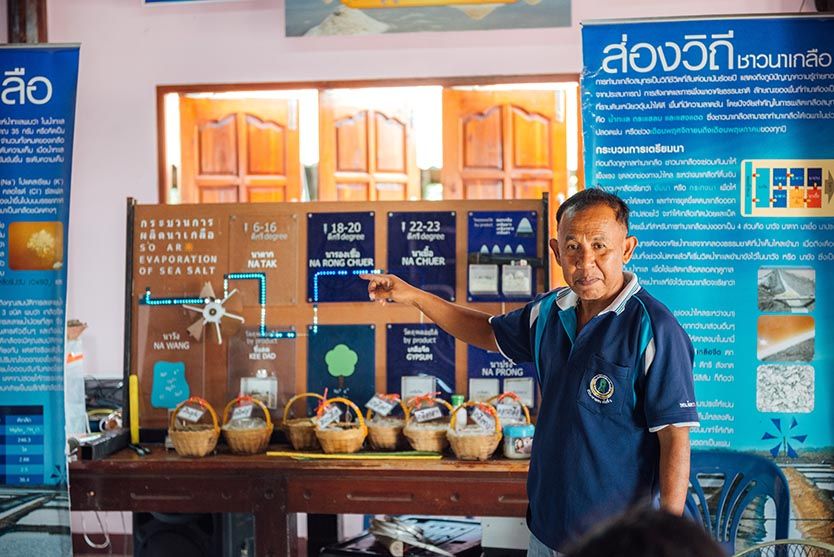
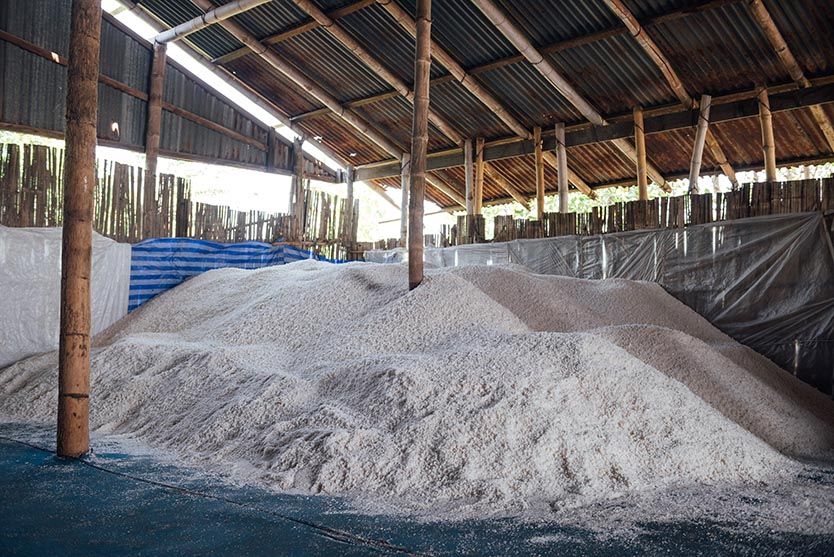
Salt farmer in Samut Songkhram diversifying his products for various markets. From fertilizer to spa scrubs.
Diversify our outlook towards the future – work for the best, prepare for the worst. Be aware of different future scenarios and work on a future that is most beneficial to you, to other people and the planet as a whole. Diversify your reading, what ever you read, add to your book list something that give you a better understanding of the human journey and the future. I recommend to read Yuval Noah Harari.
Diversify as entrepreneurs – Don’t be a monocropper, be nimble and willing to reinvent yourself. Do not rely on one field of expertise or a single income stream but innovate and diversify your core business or set up entirely new branches of income. Had Disney not launched Disney Plus Streaming Service, they would be in trouble now with their parks, retail and resorts being shut down by Covid-19.
Diversify your ability and attitude – We cannot wait for the safety net of the government, it may be slow or nonexistent. We need to help ourselves and our families first which includes accepting low-paying or high risk jobs.
Diversify the way you look at things – Ideas and ideologies will vie for your attention and you should weigh any information carefully. The content of my blogs reflect my own truth and it may not resonate with you but it can hopefully serve as way to learn from each other’s perspectives. The ultimate purpose is to achieve the most fundamental goal – the protection and well-being of yourself, your family and our only home Planet Earth.
Bonus 6
Thai wisdom: Enjoy “Slow Life”
What future do you want? Build your future. You can take this as an opportunity to slow things down and use the crisis as some sort of time-out or you can see it as a window of opportunity to reinvent yourself and think about the future you want. Higher, faster, further, may not always be in our best interest. Nature forced us to step on the brake. Time for introspection and to evaluate what really matters. Do we have to work as hard as we do? What is true happiness and how can we sustain it? Just as Self-reliance teaches us moderation it teaches us balance and this can be ultimately good for the planet.
